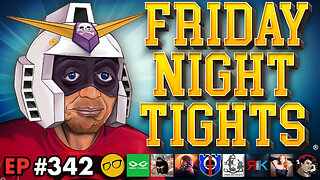Premium Only Content

Girl entry attitude 🥰 ji.....
Girl power is a slogan that encourages and celebrates women's empowerment, independence, confidence and strength. The slogan's invention is credited to the US punk band Bikini Kill, who published a zine called Bikini Kill #2: Girl Power[1] in 1991.[2] It was then popularized in the mainstream by the British girl group Spice Girls in the mid-1990s.[3]
Early usage and origins Edit
Girls wearing "Girl power" sashes at the 2017 Women's March in New York City
In 1990, US punk band Bikini Kill started to make their own self-titled feminist zine, with the first issue having the subtitle A color and activity book.[4] A year later the band published the second issue of their Bikini Kill zine, which now came with the new subtitle of Girl Power.[5] The band's lead singer, Kathleen Hanna, said was inspired by the Black Power slogan.[6] The term became popular in the early and mid 90s punk culture. The Rolling Stone Encyclopedia of Rock & Roll credits the zine with coining the slogan: "In their feminist fanzine Bikini Kill they articulated an agenda for young women in and outside of music; the band put those ideas to practice. Bikini Kill earned a reputation in the punk underground for confronting certain standards of that genre; for example, asking people to slam at the side of the stage, so that women would not get pushed out of the front, and inviting women to take the mic and talk about sexual abuse.[7]
The phrase is sometimes sensationally spelled "grrrl power", based on the spelling of "riot grrrl".[8][9]
Some other musical artists who have used the slogan in their music are Welsh band Helen Love, with it appearing in the chorus of their 1992 song “Formula One Racing Girls”,[10] and pop-punk duo Shampoo,[11] who released an album and single titled Girl Power in 1995.
Spice Girls Edit
British pop quintet Spice Girls brought the mantra into the mainstream consciousness in the mid-1990s.[12][13][14] The Spice Girls' version of "girl power" focused on the importance of strong and loyal friendship among females,[15][16] with a message of empowerment that appealed to young girls, adolescents and adult women.[17][18] According to Billboard magazine, they demonstrated real, noncompetitive female friendship, singing: "If you wannabe my lover, you gotta get with my friends. Make it last forever; friendship never ends."[12]
In all, the focused, consistent presentation of "girl power" formed the centrepiece of their appeal as a band.[18][19] Some commentators credit the Spice Girls with reinvigorating mainstream feminism in the 1990s,[12][20] with the "girl power" mantra serving as a gateway to feminism for their young fans.[16][21] On the other hand, some critics dismissed "girl power" as no more than a shallow marketing tactic, while others took issue with the emphasis on physical appearance, concerned about the potential impact on self-conscious and/or impressionable youngsters: [17] As American feminist Jennifer Pozner famously remarked, it was "probably a fair assumption to say that a ‘zig-a-zig-ah’ is not Spice shorthand for ‘subvert the dominant paradigm’.”[22] Regardless, the phrase became a cultural phenomenon,[23] adopted as the mantra for millions of girls[18][16] and even making it into the Oxford English Dictionary.[24] In summation of the concept, author Ryan Dawson said, "The Spice Girls changed British culture enough for Girl Power to now seem completely unremarkable."[25]
In 2018, Rolling Stone named the Spice Girls' brand of "girl power" on The Millennial 100, a list of 100 people, music, cultural touchstones and movements that have shaped the Millennial generation.[26]
Scholarship Edit
In her 2002 book Girl Heroes: The New Force in Popular Culture, Professor Susan Hopkins suggested a correlation between "girl power", Spice Girls, and female action heroes at the end of the 20th century.[27] A later book, Growing Up With Girl Power, by Professor Rebecca Hains (2019) found that the phrase "girl power" and the media associated with it -- such as the Spice Girls and girl heroes--diluted the phrase's impact from the riot grrrls' intent, making it more about marketing and selling the idea of empowerment than about furthering girls' actual empowerment.[28] [29]
The slogan has also been examined within the context of the academic field, for example Buffy studies.[30] Media theorist Kathleen Rowe Karlyn in her article "Scream, Popular Culture, and Feminism's Third Wave: I'm Not My Mother"[31] and Irene Karras in "The Third Wave's Final Girl: Buffy the Vampire Slayer" suggest a link with third-wave feminism.[32] Frances Early and Kathleen Kennedy in the introduction to Athena’s Daughters: Television’s New Women Warriors, discuss what they describe as a link between girl power and a "new" image of women warriors in popular culture.[33]
Oxford English Dictionary Edit
A 2001 update to the Oxford English Dictionary defined "girl power" as:
Power exercised girls; spec. a self-reliant attitude among girls and young women manifested in ambition, assertiveness, and individualism. Although also used more widely (esp. as a slogan), the term has been particularly and repeatedly associated with popular music; most notably in the early 1990s with the briefly prominent "riot grrrl" movement in the United States (cf. RIOT GIRL n.); then, in the late 1990s, with the British all-female group The Spice Girls.[34]
The dictionary further offers an example of this term by quoting from "Angel Delight", an article in the March 24, 2001 issue of Dreamwatch about the television series Dark Angel:
After the Sarah Connors and Ellen Ripleys of the 1980s, the 1990s weren't so kind to the superwoman format—Xena Warrior Princess excepted. But it's a new 2000 millennium now, and while Charlie's Angels and Crouching Tiger, Hidden Dragon are kicking up a storm on movie screens, it's been down to James Cameron to bring empowered female warriors back to television screens. And tellingly, Cameron has done it by mixing the sober feminism of his Terminator and Aliens characters with the sexed-up girl power of a Britney Spears concert. The result is Dark Angel.[35]
Criticism Edit
Girl Power slogan on display at a women's march in Sacramento, California
Dr. Debbie Ging, Chair of the BA in Communications Studies in Dublin City University, was critical of the "Girl power" ideals, and linked it to the sexualisation of younger children, girls in particular.[36] Amy McClure of North Carolina State University warns against placing too much hope on girl power as an empowering concept. She says, “An ideology based on consumerism can never be a revolutionary social movement. The fact that it appears to be a revolutionary movement is a dangerous lie that not only marketers sell to us but that we often happily sell to ourselves.”[37] Media can sometimes present a narrow definition of what it means to be a girl today. One common example being popular toys such Mattel's Barbie. The recent “I can be” Barbie[38] embodies this concept of “girl power”: that little girls can be anything they want when they grow up. Arguably, Barbie's image may also present narrowed options with which girls can identify.[39] Hannah Jane Parkinson of The Guardian criticized the term as something "young women [that] are feeling more confident about calling themselves feminists and standing up for principles of equality" hide behind and denounced it for including the word "girl", claiming it promoted the calling of adult women as girls.[40]
See also Edit
Feminism portal
List of female action heroes
International Day of the Girl Child
Phallus-girl
Post-feminism
Women warriors in literature and culture
Girl Heroes (2002)
Wonder Women! The Untold Story of American Superheroines (2012)
Xena: Warrior Princess in popular culture
References Edit
"Kathleen Hanna | Bikini Kill Girl Power".
"Bikini Kill".
Taylor, Alex (24 May 2019). "Spice Girls: What happened to Girl Power?". BBC News. Retrieved 23 February 2021.
http://www.artzines.info/wp-content/uploads/2017/06/Bikini-Kill.pdf
Coscarelli, Joe (July 11, 2016). "Kathleen Hanna on Hit Reset, Her Recovery and Her Feminist Path". The New York Times. Retrieved 2017-06-13.
Marcus, Sara (2010). Girls to the Front. New York: Harper Perennial.
"Bikini Kill Bio". RollingStone.com. Archived from the original on May 7, 2011. Retrieved 2017-06-13.
Gonick, Marnina (2008). "Girl Power". Girl Culture. Westport, Conn. [u.a.]: Greenwood Press. pp. 310–314. ISBN 978-0-313-33909-7.
Leonard, Marion (1997). "'Rebel Girl, You Are the Queen of My World': Feminism, 'Subculture' and Grrrl Power". Sexing The Groove: Popular Music and Gender. London: Routledge. pp. 230–55. ISBN 978-0-415-14670-8.
"Helen Love - Gabba Gabba We Accept You". Homepage.ntlworld.com. Archived from the original on 2012-10-23. Retrieved 2012-09-30.
"Shampoo - Interview by Alexander Laurence". Free Williamsburg. April 2001. Retrieved 2012-09-30.
"Spice Girls' 'Wannabe': How 'Girl Power' Reinvigorated Mainstream Feminism in the '90s". Billboard. Retrieved July 15, 2016.
"From Title IX to Riot Grrrls". Harvard Magazine. January–February 2008. Retrieved 2012-09-30.
"Girl power | You've come a long way baby". BBC News. December 30, 1997. Retrieved 2012-09-30.
""Girl Power is just a Nineties way of saying it." How feminism went pop during the reign of the Spice Girls". stylist.co.uk. Archived from the original on February 21, 2017. Retrieved February 12, 2017.
"Girl Power!: The Spice Girls and Feminism". The 13th Floor. Archived from the original on February 21, 2017. Retrieved July 9, 2016.
"How the Spice effect still packs punch". BBC News. July 7, 2016. Retrieved February 9, 2017.
“You've come a long way baby...". BBC. 30 December 1997.
“20 years of Girl Power: Were the Spice Girls feminists or just opportunists?”. Irish Independent. 6 July 2016.
"It's Time To Give The Spice Girls The Credit They Deserve". The Huffington Post. August 6, 2015. Retrieved February 15, 2017.
"The Spice Girls were my gateway drug to feminism". The Guardian. 13 December 2012. Retrieved December 13, 2012.
Harris, John (July 16, 2006). "Girl power as anarchism". The Guardian. Retrieved 8 November 2021.
Will there ever be another girl band like the Spice Girls?. New Statesman. 14 July 2016.
BBC News. Article on "Girl Power" being added to the Oxford English Dictionary. British Broadcasting Corporation. 17 January 2002.
Dawson, Ryan. "Beatlemania and Girl Power: An Anatomy of Fame". Bigger Than Jesus: Essays On Popular Music. University of Cambridge. Archived from original on 28 April 2005. Retrieved 17 February 2017.
"The Millennial 100: #2.The Spice Girls' 'Girl Power'". Rolling Stone. October 17, 2018. Retrieved February 2, 2021.
Costi, Angela (October 4, 2002). "Super Slick Power Chicks: The New Force or Elaborate Parody?". Senses of Cinema. Retrieved 2012-09-30.
Hains, Rebecca (2019). Growing Up With Girl Power - Girlhood On Screen and in Everyday Life. New York: Peter Lang. p. 315. Retrieved 8 November 2021.
Hains, Rebecca (2009). "Power Feminism, Mediated: Girl Power and the Commercial Politics of Change". Women's Studies in Communication. 32 (1): 89–113. Retrieved 8 November 2021.
"The Third Wave's Final girl: Buffy the Vampire Slayer" Archived June 20, 2005, at the Wayback Machine
Karlyn, Kathleen Rowe (2003). "Scream, Popular Culture, and Feminism's Third Wave: I'm Not My Mother". Genders. Archived from the original on 2012-06-12. Retrieved 2012-09-30.
Karras, Irene (2002). "The Third Wave's Final Girl: Buffy the Vampire Slayer". Thirdspace: A Journal of Feminist Theory & Culture. 1 (2). ISSN 1499-8513.
Riley, Robin (May 2004). "Review of Early, Frances; Kennedy, Kathleen, eds., Athena's Daughters: Television's New Women Warriors". H-Net Reviews. Archived from the original on 2007-06-10. Retrieved 2012-09-30.
"OED:Girl power". Oxford English Dictionary. Retrieved 2012-09-30.
"darkangelfan.com". www.darkangelfan.com. Archived from the original on January 5, 2008.
Ging, Debbie. "Girl Power" doesn’t empower: why it’s time for an honest debate about the sexualisation of children in Ireland July 2007.
[1] Archived January 31, 2008, at the Wayback Machine
"Barbie Toys & Playsets | Mattel". Mattel Shop.
Lamb, Sharon; Brown, Lyn Mikel (2007). Packaging Girlhood: rescuing our daughters from marketers' schemes. New York: St. Martin's Griffin. ISBN 9780312370053.
Hannah Jane Parkinson (8 July 2015). "Stop calling women 'girls'. It's either patronising or sexually suggestive". The Guardian. Retrieved 25 November 2016.
Bibliography Edit
Early, Frances H.; Kennedy, Kathleen (2003). Athena's Daughters: Television's New Women Warriors. Syracuse, New York: Syracuse Univ. Press. ISBN 9780815629689. Preview.
Evans Amanda and Tara Brabazon, "I'll never be your woman: the Spice Girls and new flavours of feminism." Social Alternatives 17#2 (1998): 39–42.
Gateward, Frances; Pomerance, Murray, eds. (2002). Sugar, Spice, and Everything Nice: Cinemas of Girlhood. Detroit: Wayne State University Press. ISBN 9780814329184. Preview.
Helford, Elyce Rae (2000). Fantasy Girls: Gender in the New Universe of Science Fiction and Fantasy Television. Lanham, Maryland: Rowman & Littlefield. ISBN 9780847698356. Preview.
Hopkins, Susan (2002). Girl Heroes: The New Force in Popular Culture. Australia: Pluto Press. ISBN 9781864031577
Inness, Sherrie A., ed. (2004). Action Chicks: New Images of Tough Women in Popular Culture. New York: Palgrave Macmillan. ISBN 9781403963963. Preview.
Inness, Sherrie A. (1999). Tough Girls: Women Warriors and Wonder Women in Popular Culture. Pennsylvania, Philadelphia: University of Pennsylvania Press. ISBN 9780812234664.
Inness, Sherrie A., ed. (1997). Nancy Drew and company: culture, gender, and girls' series. Bowling Green, Ohio: Bowling Green State University Popular Press. ISBN 9780879727369. Preview.
Karlyn, Kathleen Rowe (2003). "Scream, popular culture, and feminism's third wave: 'I'm Not My Mother'". Genders Journal: Presenting Innovative Work in the Arts, Humanities, and Social Sciences. University of Colorado. 38.
Karras, Irene (March 2002). "The third wave's final girl: Buffy the Vampire Slayer". Thirdspace: A Journal of Feminist Theory & Culture. Simon Fraser University. 1 (2).
Magoulick, Mary (October 2006).
1 COMMENT
Add a comment...
0/2000
COMMENT
SeeYouNextTuesday, 4 days ago
Oink Oink!
DELETEREPLY
1
38m17s
Banishment from the Financial System: the War on Dissent
Glenn Greenwald
30s
Male bird's attempt to impress female makes her run for the hills
EmotionsofAfrica
6s
Dad pushes kid in stroller while he's skiing
orsolyahernyik
30m37s
DIY Incredible Fire Place Build!
DIY Wife
10m44s
Nunes: TRUTH Social to begin onboarding Apple users this week
Devin Nunes
2h12m40s
Ep. 101 - Viva & Barnes LIVE! From Ottawa to Washington Law
-
 37:44
37:44
Glenn Greenwald
19 hours agoGlenn On Tearing Down the Military Industrial Complex, Exposing Pro-Israel Indoctrination, and More | SYSTEM UPDATE #411
138K200 -
 4:04:20
4:04:20
Nerdrotic
18 hours ago $57.17 earnedAmazon Takes 007! Hollywood is Lost, Disney Cancels WHO? | Friday Night Tights 342 /w ItsAGundam
196K55 -
 43:27
43:27
Tucker Carlson
17 hours agoRay Dalio: America’s Hidden Civil War, and the Race to Beat China in Tech, Economics, and Academia
213K210 -
 56:56
56:56
Candace Show Podcast
18 hours agoEXCLUSIVE: Taylor Swift Will Be Deposed. | Candace Ep 150
248K200 -
 1:03:52
1:03:52
IsaacButterfield
14 hours ago $10.86 earnedRepublican Vs 25 Transgender Activists | Jewish Outrage | Lizzo Loses All the Weight
86.4K23 -
 1:10:23
1:10:23
Edge of Wonder
18 hours agoChinese Biochips Hacking Minds? Quantum Control & Journey Song Mandela Effect
101K9 -
 2:15:46
2:15:46
Quite Frankly
21 hours ago"Ghosts, Robotics, and OBE's" ft. Dr. Albert Taylor 2/21/25
90.1K19 -
 55:52
55:52
LFA TV
1 day agoMaking Germany Great Again | TRUMPET DAILY 2.21.25 7PM
60.6K12 -
 1:52:26
1:52:26
2 MIKES LIVE
17 hours ago2 MIKES LIVE #183 Open Mike Friday with Hannah Faulkner and Adelia Kirchner!
44.5K -
 12:09
12:09
MrBigKid
17 hours ago $3.57 earnedNew Mossberg 590R: Tactical Homestead Defender
48.2K7